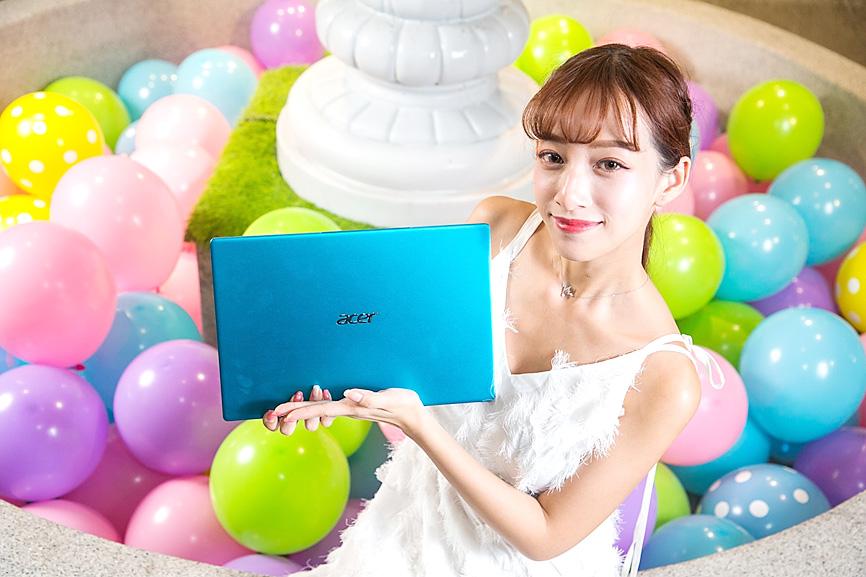Despite a semiconductor shortage, global PC shipments in the first quarter of this year increased 32 percent from a year earlier, preliminary data from research firm Gartner Inc showed.
Shipments in the January-to-March period totaled 69.87 million units from 52.93 million units a year earlier, Gartner said in a report on Monday last week.
The quarterly increase in shipments marked the fastest annual growth since it began tracking the PC market in 2000, Gartner said.

Photo courtesy of Acer Inc
“This growth should be viewed in the context of two unique factors: comparisons against a pandemic-constrained market and the current global semiconductor shortage,” Gartner research director Mikako Kitagawa said in a news release.
“Without the shipment chaos of early 2020, this quarter’s growth might have been lower. However, semiconductor shortages are now adversely affecting the supply chain once again, with shipment lead times for some PCs extending out as far as four months,” Kitagawa said.
PC demand is to remain strong, even after stay-at-home restrictions ease as countries gain control over COVID-19 outbreaks, but vendors and suppliers should avoid creating excess inventory, Gartner said.
In particular, growing PC demand in the educational segment — after the COVID-19 pandemic forced many schools to turn to distance learning — has prompted many vendors to build up their Chromebook inventory, it said.
Chromebook shipments in the first quarter more than tripled from a year earlier, Gartner said, adding that the growth was primarily driven by educational institutions in North America.
An analysis released on April 9 by International Data Corp (IDC) showed that global PC shipments in the first quarter increased 55.2 percent to 83.98 million units year-on-year.
While seasonal factors, component shortages and logistical issues caused the figure to fall 8 percent from the fourth quarter of last year, the sequential decline was the smallest since the first quarter of 2012, when PC shipments declined 7.5 percent sequentially, IDC said in a statement.
The rival researchers use different calculations to measure the market — Gartner defines PCs as desktops, notebooks and ultramobile premium devices, while IDC categorizes them as desktops, notebooks and workstations.
“Unfulfilled demand from the past year has carried forward into the first quarter and additional demand brought on by the pandemic has also continued to drive volume,” IDC research manager Jitesh Ubrani said in the statement.
Other factors — such as growth in gaming, the need for higher-performance notebooks in the enterprise market and an increase in demand for touchscreens within the education segment — helped to drive PC demand in the first quarter, the research firm said.
However, the ongoing semiconductor shortage is delaying vendors’ ability to restock inventory and fill customer orders, IDC mobile device trackers program vice president Ryan Reith said in the statement.
“All three segments — business, education and consumer — are experiencing demand that we didn’t expect to happen, regardless of many countries beginning their ‘opening up’ process,” Reith said.
“Component shortages will likely be a topic of conversation for the majority of 2021, but the more important question should be what PC demand will look like in two to three years,” Reith added.
In both the Gartner and IDC reports, Lenovo Group Ltd (聯想) was the No. 1 vendor in the first quarter, followed by HP Inc and Dell Technologies Inc, with Apple Inc and Acer Inc (宏碁) rounding out the top five.

Intel Corp chief executive officer Lip-Bu Tan (陳立武) is expected to meet with Taiwanese suppliers next month in conjunction with the opening of the Computex Taipei trade show, supply chain sources said on Monday. The visit, the first for Tan to Taiwan since assuming his new post last month, would be aimed at enhancing Intel’s ties with suppliers in Taiwan as he attempts to help turn around the struggling US chipmaker, the sources said. Tan is to hold a banquet to celebrate Intel’s 40-year presence in Taiwan before Computex opens on May 20 and invite dozens of Taiwanese suppliers to exchange views

Application-specific integrated circuit designer Faraday Technology Corp (智原) yesterday said that although revenue this quarter would decline 30 percent from last quarter, it retained its full-year forecast of revenue growth of 100 percent. The company attributed the quarterly drop to a slowdown in customers’ production of chips using Faraday’s advanced packaging technology. The company is still confident about its revenue growth this year, given its strong “design-win” — or the projects it won to help customers design their chips, Faraday president Steve Wang (王國雍) told an online earnings conference. “The design-win this year is better than we expected. We believe we will win

Chizuko Kimura has become the first female sushi chef in the world to win a Michelin star, fulfilling a promise she made to her dying husband to continue his legacy. The 54-year-old Japanese chef regained the Michelin star her late husband, Shunei Kimura, won three years ago for their Sushi Shunei restaurant in Paris. For Shunei Kimura, the star was a dream come true. However, the joy was short-lived. He died from cancer just three months later in June 2022. He was 65. The following year, the restaurant in the heart of Montmartre lost its star rating. Chizuko Kimura insisted that the new star is still down

While China’s leaders use their economic and political might to fight US President Donald Trump’s trade war “to the end,” its army of social media soldiers are embarking on a more humorous campaign online. Trump’s tariff blitz has seen Washington and Beijing impose eye-watering duties on imports from the other, fanning a standoff between the economic superpowers that has sparked global recession fears and sent markets into a tailspin. Trump says his policy is a response to years of being “ripped off” by other countries and aims to bring manufacturing to the US, forcing companies to employ US workers. However, China’s online warriors